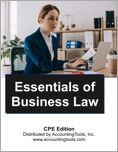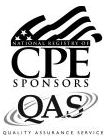Essentials of Business Law (CPE Course)
Related Courses
CPE Credit: 15 hours
Course Type: Downloaded PDF materials with online test
Price (with PDF Textbook): $100
Course Description
A key aspect of risk reduction is to understand how the legal system impacts the operations of a business. In the Essentials of Business Law course, we cover a broad range of legal topics that can have an adverse impact on a business. Topics covered include intellectual property, sales contracts, negotiable instruments, agency relationships, corporate governance, government regulations, and much more. After taking this course, one should have a much better understanding of which legal issues are most applicable to the specific circumstances of one’s business.
Author: Steven Bragg
Course Number: BL0002
Table of Contents
Chapter 1. The Legal Environment
Chapter 2. Liability
Chapter 3. Intellectual Property
Chapter 4. White-Collar Crime
Chapter 5. Introduction to Contracts
Chapter 6. Sales Contracts
Chapter 7. Warranties
Chapter 8. Negotiable Instruments
Chapter 9. Credit Transactions
Chapter 10. Bankruptcy
Chapter 11. Agency Relationships
Chapter 12. Labor Law
Chapter 13. Business Types
Chapter 14. Corporate Governance
Chapter 15. Business Financing
Chapter 16. Corporate Acquisitions
Chapter 17. Inter-Company Arrangements
Chapter 18. Government Regulation
Chapter 19. Personal Property and Real Property
Learning Objectives
State the ordering of the sources of law.
Specify the meaning of full faith and credit.
Describe the different types of dispute settlement systems.
Specify how the concept of strict liability works.
Specify the characteristics of intellectual property.
Identify the statutes governing the protection of trade secrets.
Recall the process for obtaining a patent.
Specify the different types of crimes.
Describe the different types of fraud crimes.
Specify the elements of a valid contract.
Specify when an offer has been accepted.
Recall the requirements to prove that there was fraud in a contract.
Recall the rules pertaining to mistakes in contracts.
Specify when a contract is considered to be unconscionable.
Identify the rules pertaining to the evidence of terms relating to a contract.
Recall the rules pertaining to the assignment of contractual rights.
Recall the criteria for when a sales contract has been formed.
Specify the conditions under which a seller can demand the return of goods.
Identify the criteria for when a buyer is assumed to have accepted goods.
Recall the rules relating to express and implied warranties.
Specify the types of warranties that a merchant provides to its buyers.
Identify the types of delays associated with the availability of cash from a check.
Recall the characteristics of a special indorsement.
Specify the warranties related to negotiable instruments.
Identify the defenses against the payment of a negotiable instrument.
Recall how a mechanic’s lien works.
Specify how a surety arrangement works.
Identify the circumstances under which a lender can seize the property of a borrower.
Recall the conditions for creating a security interest in a borrower’s personal property.
Specify the priority of claims in a credit arrangement.
Identify the tasks imposed on a creditors’ committee in bankruptcy proceedings.
Recall the criteria for initiating an involuntary bankruptcy.
Specify the priorities for fund payouts in a bankruptcy.
Identify the criteria for an individual to qualify for a Chapter 7 bankruptcy filing.
State the duties of a principal and agent.
Recall when an agency agreement can be terminated.
Specify when a principal can be held liable for the actions of an agent.
Identify when an agent can be held liable for a contract.
Recall the provisions of the various statutes governing labor law.
Specify the goal of an affirmative action program.
Identify the purpose of the federal agencies involved in labor law issues.
Recall the reasons why someone would want to join a labor union.
Specify how a union certification process can be shortened.
Identify how an unfair labor practice claim can be filed.
Recall the advantages and disadvantages of the various business types.
Specify what a limited partner is allowed to do in a limited partnership.
Identify the purpose of a buy-and-sell arrangement.
Recall the purpose of an indenture agreement.
Specify the criteria for the filing of a short-swing profit lawsuit.
Identify the reasons for the existence of blue sky laws.
Recall when the exemptions to the securities laws can and cannot be used to raise money.
Specify the thresholds required for a Hart-Scott-Rodino filing.
Identify how the failing company doctrine works.
Recall the different types of franchising arrangements.
Specify the requirements for blocking a proposed merger due to anticompetitive effects.
Identify the different types of real property ownership arrangements.
Level: Overview
Instructional Method: QAS Self-Study
NASBA Category: Business Law
Prerequisites: None
Advance Preparation: None
Latest Review Date: July 2024
Program Registration Requirements: Click on "Purchase Course" near the top of this page to pay for and access the course. You will then be able to download the course as a PDF file, then take an on-line examination, and then download a certificate of completion if you pass the examination.
Program Refund Policy: For more information regarding administrative policies concerning complaints, refunds, and other matters, see our policies page.
AccountingTools, Inc. is registered with the National Association of State Boards of Accountancy (NASBA) as a sponsor of continuing professional education on the National Registry of CPE Sponsors. State boards of accountancy have the final authority on the acceptance of individual courses for CPE credit. Complaints regarding registered sponsors may be submitted to the National Registry of CPE Sponsors through its website: www.nasbaregistry.org.
The NASBA sponsor identification number for Accountingtools, Inc. is 115881.
AccountingTools is an IRS Approved Continuing Education Provider. We are compliant with the requirements for continuing education providers (as described in sections 10.6 and 10.9 of the Department of Treasury’s Circular No. 230 and in other IRS guidance, forms, and instructions). Our IRS Approved Continuing Education Provider number is 72821.


